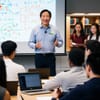Nvidia's CEO, Jensen Huang, believes that studying physical sciences would be more beneficial for future graduates than focusing on software sciences. In an interview, Huang mentioned that if he were a 20-year-old graduate in 2025, he would likely choose to study physical sciences over software sciences. This advice stems from his vision of AI's evolution, particularly the next wave of AI, which he calls "Physical AI."
Physical sciences encompass disciplines that study non-living systems, including physics, chemistry, astronomy, and earth sciences. Huang emphasizes that understanding these physical principles is crucial for developing AI systems that can interact with and manipulate the physical world. This includes applications in robotics, where AI can predict object movement, apply appropriate force, and detect hidden obstacles.
Huang sees AI progressing through several phases, from perception and generative AI to reasoning and physical AI. By focusing on physical sciences, future graduates can position themselves to contribute to the development of Physical AI and its applications in fields like robotics and manufacturing.
According to Huang, understanding the laws of physics, friction, inertia, and cause and effect is essential for developing AI systems that can navigate and interact with the physical world. With the increasing importance of Physical AI, Huang's advice highlights the need for a strong foundation in physical sciences to drive innovation and progress in the field.


